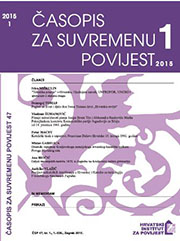“Tehnička pitanja” – Hrvatska, Ujedinjeni narodi, UNPROFOR, UNCRO i sporazum o statusu snaga
“TECHNICAL ISSUES” – CROATIA, UNITED NATIONS, UNPROFOR, UNCRO AND THE STATUS OF FORCES AGREEMENT
Author(s): Ivica MiškulinSubject(s): History, Military history, Transformation Period (1990 - 2010)
Published by: Hrvatski institut za povijest
Keywords: Republic of Croatia; the Homeland War; the United Nations (UN); peacekeeping operations of the UN in Croatia; UNPROFOR; UNCRO; the Status of Forces Agreement (SOFA);
Summary/Abstract: If, as had been done by the rare authors who analyzed the issue of the Status of Forces Agreement’s conclusion between the UN and the states of former Yugoslavia, one views SOFA solely as an indicator of the degree of cooperation, then Croatia can be characterized as one of the least cooperative participants. Zagreb primarily used the Agreement as a political tool which was supposed to ensure the return of the Croatian authorities in the occupied territories. It was not the most important political asset: infighting about legal status of the peacekeepers was, of course, in the shadow of official and unofficial initiatives and limited military operations, all of which was aimed to redefine the ineffective mandate of the peacekeeping forces of the UN. The financial aspect or the profit, which Zagreb had earned by using the presence of more than twenty thousand foreigners on its territory, can still be rated as a motif of secondary importance: on one hand, it resulted from a failure of political instrumentalisation of the Agreement during 1992, as well as retaliation arising from the infirmity to transform the UNPROFOR into a more efficient type of peacekeeping forces. Zagreb’s tactics on the Status of Forces Agreement had probably brought itself an unnecessary diplomatic damage. Nevertheless, it was the tactics that Zagreb could afford. In an atmosphere with a lack of cooperation of other parties in the conflict (mostly of the Krajina Serbs), the attempt was illegal, but not illegitimate. In any case, the maneuverability of Zagreb would be largely reduced if in March of 1992 the UN approved the proposal of the Agreement for which it had been ready from the second half of 1993. Or, that the UN had accepted the Croatian proposal to define the terms of territory and power, which would have been in accordance with Croatian international legal position at that time. This indicates that the UN position was largely legal, but essentially it was based on its own interpretation of the term. So, probably the beginning of 1992 was therefore the most suitable moment to conclude the Agreement with Croatia. Later, the growing discontent of Zagreb by the UNPROFOR’s effect in the implementation of the mandated tasks was probably an insurmountable obstacle. However, the UN cannot be fully acquitted of the tactics related to the Agreement: from the fact that the insistence on the type model agreement ignores the particularities of the country with which the contract is concluded, the questionable morality of some legal procedures by the UN peacekeepers, the inability to establish an effective system of coordination with individual contingents of peacekeeping forces to the preference of protection of the UN financial interests at the expense of the Croatian legislation.
Journal: Časopis za suvremenu povijest
- Issue Year: 47/2015
- Issue No: 1
- Page Range: 7-37
- Page Count: 31
- Language: Croatian

